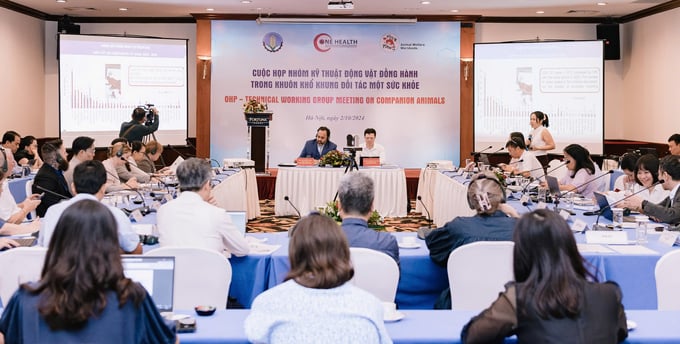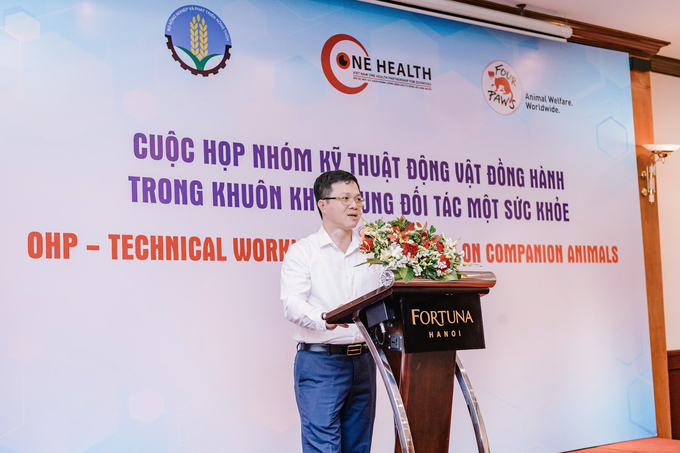December 3, 2025 | 09:58 GMT +7
December 3, 2025 | 09:58 GMT +7
Hotline: 0913.378.918
December 3, 2025 | 09:58 GMT +7
Hotline: 0913.378.918

Overview of the OHP - Technical Working Group meeting. Photo: OHP.
On October 2, the OH Partnership on Zoonotic Disease Prevention led by the Ministry of Agriculture and Rural Development, in coordination with the FOUR PAWS International organized the 2nd Companion Animal Technical Working Group Meeting which was co-chaired by the Director General of the Department of Animal Health, Dr. Nguyen Van Long and Dr. Karan Kukreja, Head of the Companion Animal Campaigns in Southeast Asia.
Speaking at the Conference, Mr. Nguyen Van Long, Director General of the Department of Animal Health, highly appreciated the role and significance of the Working Group, reflecting on hot issues of current events, with multi-sectoral coordination from health, environment, tourism, agriculture and culture to implement the duties related to food safety control, rabies from companion animals slaughtering, as well as manage the enforcement of animal welfare during captivity, violence against companion animals, etc.
At the 1st Meeting, the Working Group agreed on the basic contents of state management and the key functions and tasks of the group, from which, there was a basis for operation and clarification of the responsibilities of relevant parties, and resource shortages to find ways to resolve them together. At the 2nd meeting, the Working Group discussed the roadmap to implement a pilot program in several provinces and cities in Vietnam, especially the task of rescuing animals in natural disasters to ensure human and animal health and avoid economic losses when animals were in natural disasters.
Accordingly, the Group called on international partners to support the Ministry of Agriculture and Rural Development to implement several pilot models of non-dog and cat meat trade and consumption in several provinces and cities with high tourism attraction following the successful experiences from Korea and Cambodia.

Mr. Nguyen Van Long, Director General of the Department of Animal Health, highly appreciated the role and significance of the Working Group, reflecting on hot issues of current events to implement the duties related to food safety control, rabies from companion animals slaughtering, etc. Photo: OHP.
The National Institute of Hygiene and Epidemiology, Ministry of Health, reported on the situation of rabies management in humans, recommended that management agencies, especially at the local level should tighten the management and control of rabies from dogs and cats, and emphasized the role of communication to raise public awareness, and vaccination against rabies for pets are fundamental solutions to ensure the health and safety of people and animal.
The meeting hope that through the Companion Animals technical working group, with the joint efforts of international and national partners, better coordination between veterinary and grassroots health care will be enhanced to coordinate throughout the control of rabies. At the same time, the Ministry of Agriculture and Rural Development also look for large - scaled programs on rabies and animal welfares to support the very little and limited domestic resources.
It is necessary to mobilize domestic and international resources to increase awareness and enforcement of relevant laws and regulations on animal husbandry, veterinary medicine, animal welfare domestically and internationally, investment in infrastructure, barns, slaughter conditions, medical conditions, etc.
At the same time, the Working Group also emphasized the need to take advantage of integration conditions, proactively apply international processes to integrate and meet international requirements of enterprises, associations, cooperatives on veterinary medicine, animal husbandry, etc.

FOUR PAWS International co-chair, Dr. Karanvir Kukreja, Head of Companion Animals Campaign - Southeast Asia affirmed that the Companions Animals Technical Working Group (CA TWG) serves as a platform to encourage joint efforts from different stakeholders in support of the Government of Vietnam, in discussing and addressing One health concerns involving companion animals. Photo: OHP.
On behalf of the FOUR PAWS International co-chair, Dr. Karanvir Kukreja, Head of Companion Animals Campaign - Southeast Asia affirmed that the Companions Animals Technical Working Group (CA TWG) serves as a platform to encourage joint efforts from different stakeholders in support of the Government of Vietnam, in discussing and addressing one health concerns involving companion animals. Breaking all barriers to join efforts in rabies elimination in Vietnam is essential, including addressing the dog and cat meat trade, which poses a significant risk to public health and safety. FOUR PAWS believe that meetings under CA TWG will have frank and productive discussions to foster collaboration that will lead to tangible improvements in animal and human welfare.
The Working Group has attracted the attention, participation and commitment to act together from ministries, domestic and international organizations, including the online participation of 23 Departments of Agriculture and Rural Development in the Northern, Central and Southern provinces.
Translated by Dieu Linh

(VAN) This is an initiative of MAE aimed at creating a unified coordination mechanism to implement agricultural cooperation programs with developing countries.

(VAN) Con Dao National Park officially received its Green List status after it was announced at the IUCN World Conservation Congress in Abu Dhabi in October.

(VAN) The National Assembly’s inspection delegation called for a renewed approach to marine economic development, the removal of legal 'bottlenecks,' and strengthened marine environmental protection.

(VAN) The inevitable path forward is to reorganize production along the value chain, utilizing cooperatives as the core, enterprises as the driving force, and farmers as the central subjects.

(VAN) On November 28, Minister Tran Duc Thang, together with China's Minister of Agriculture and Rural Affairs Han Jun, chaired the 2nd meeting of the Viet Nam - China Agricultural Cooperation Committee.

(VAN) Forest carbon credits are only accepted when they ensure absolute environmental integrity, additionality, permanence, and transparency.

(VAN) Viet Nam partners with Beijing on controlling air pollution, cross-regional management, high-tech monitoring and relocating polluting facilities.